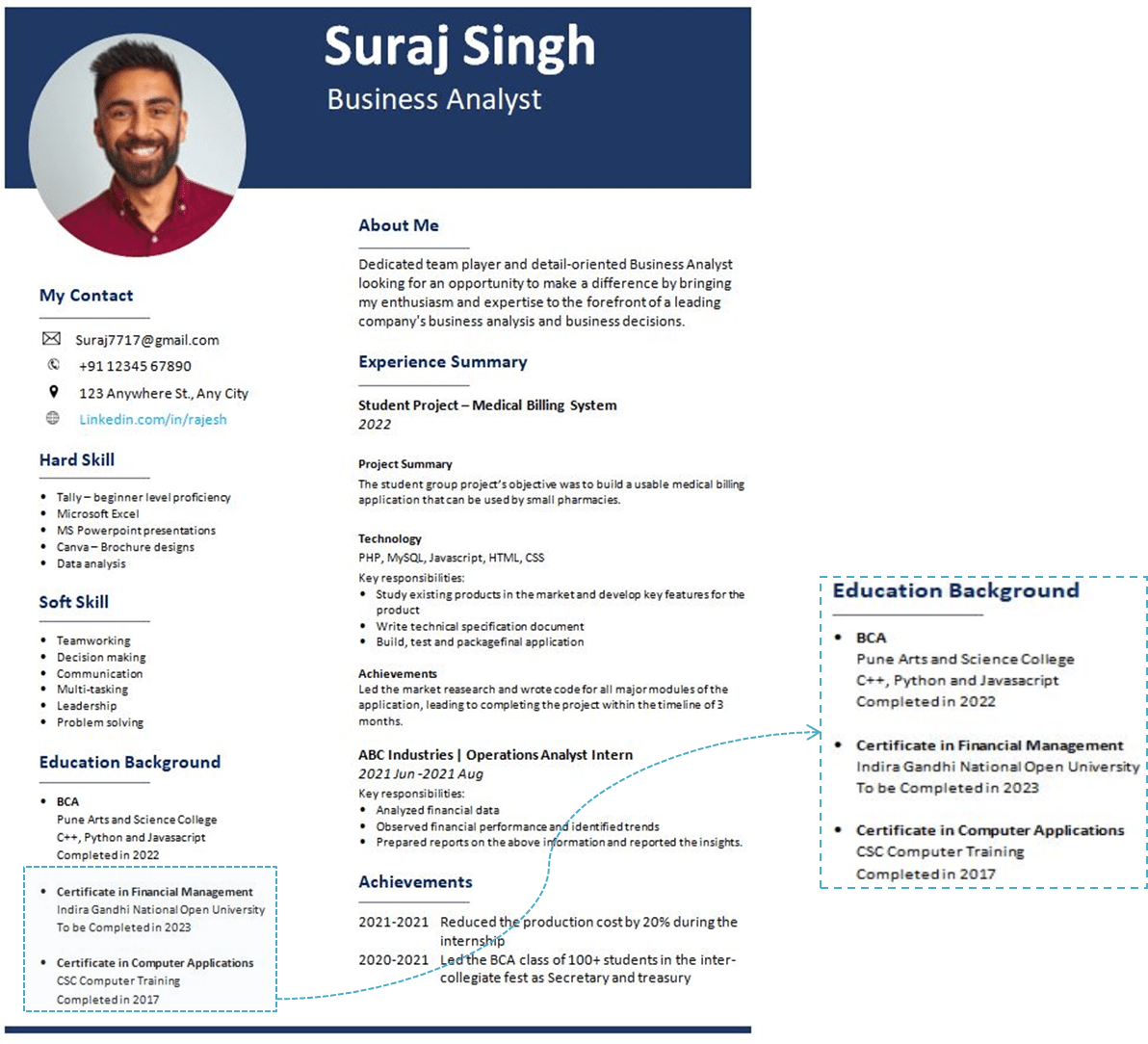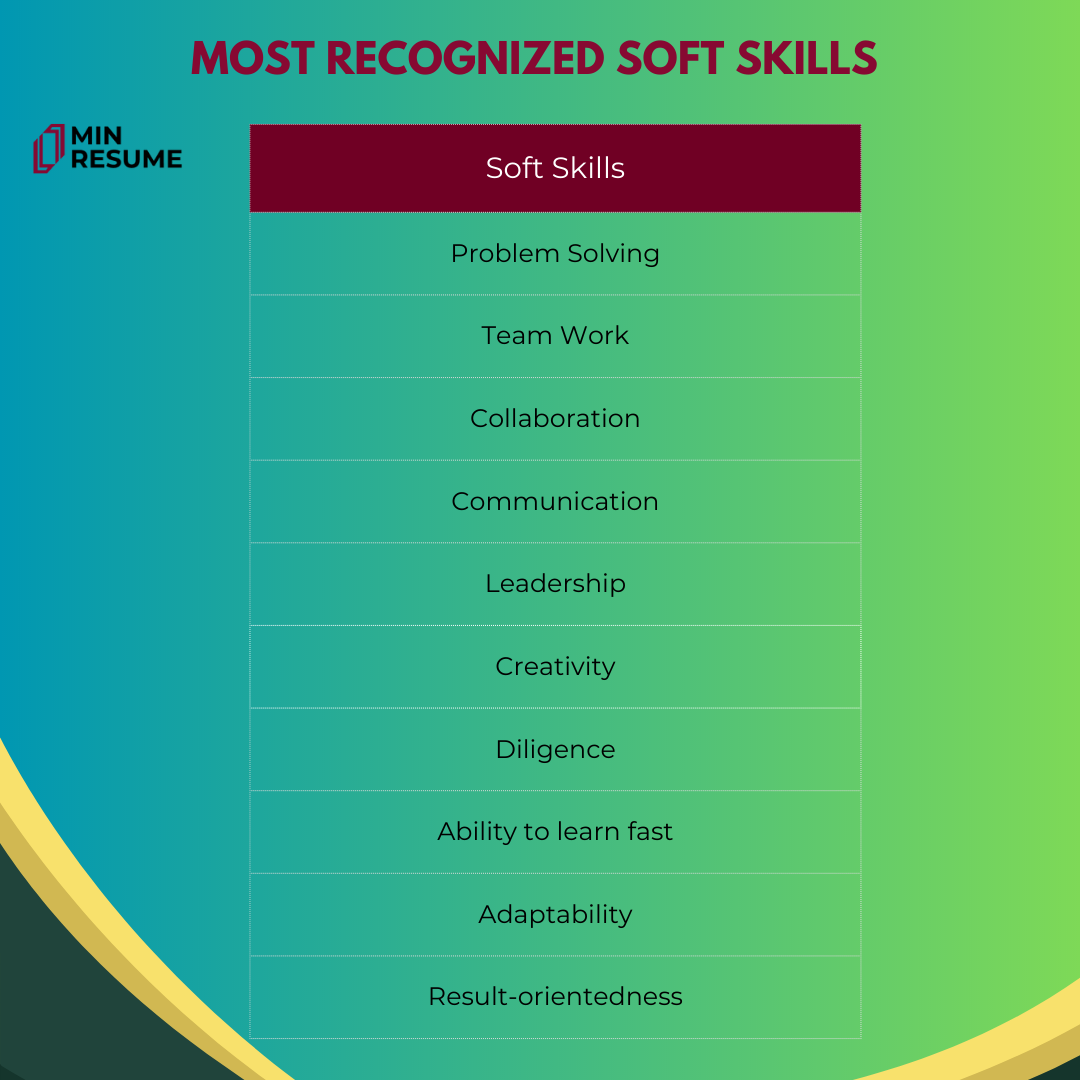How to write a resume if you have no work experience

15 Jul 2023

Why are we writing this article?
In India alone there are 7 million new graduates every single year (Reference: Number of undergraduate awardees in India) and it felt appropriate to dedicate an article to help our fresh graduate friends how to go about creating their first resume.
It is normal that people who flash their resumes usually have at least a couple of years of experience; but what if one does not have any work experience?
What will you learn in this article
1. What are the essential sections on your resume if you have no work experience
2. How to list your credentials to compensate for lack of work experience
3. Some common mistakes to avoid on your first resume
The process of creating a resume if you don't have any work experience at all is nothing to be worried about and it is actually quite simple if you think about what your strengths are and what kind of jobs you are looking for.
Are resumes important if you don't have work experience?
Much to many's surprise, absolutely yes!
Resumes are not just about your work experience. So, for recent college graduates, the job opportunities and attractiveness to an employer lay in the skills the graduate brings.
The reason employers look to work experience is because it serves as a great living proof that the skills someone claims to possess are likely to be true since the skills can be seen in action via work experience.
Subsequently, anything that a fresh graduate can show on their resume that demonstrates skills that are relevant to the job they are applying to can be easily considered an alternative to traditional work experience.
Your task when creating your first resume now then effectively boils down to listing those opportunities that you pursued and highlighting how you applied the skills you claim you possess.
If you haven't read the article we wrote on "How to create your resume", we highlighly recommend that you read since it touches on all aspects of a resume in the moderen era.
Sections you need on your resume
These are the only sections you need on your resume if you don't have any work experience at all.
- Career objective
- Education
- Skills
- Training and Certifications
- Project Experience
- Hobbies & Interests
1. Writing your career objective statement
The only thing that matters in writing your career objective statement is that it is free of errors.
Simple career objective statements are the best.
Do not get fancy. You are not going to impress the recruiters just by having a wordy objective statement.
Just focus on writing an error-free objective statement.
The real value of writing an objective statement lies in using it to cleverly say why you are applying to the specific job you are applying to.
The Do's
- Keep your objective statement as simple as possible.
- Make the objective statement reflect key expectations from the job description.
- Make sure there are no grammatical or punctuation errors.
Avoid These Common Mistakes When Writing Career Objective Statements
When crafting a resume without any prior work experience, the career objective statement plays a crucial role in capturing the attention of potential employers. However, many individuals make avoidable mistakes when writing their career objective statements. We will explore the most common mistakes made by those without work experience and provide tips on how to create effective objective statements that can help you stand out in the job market.
a. Being too generic
One of the biggest mistakes individuals make is using generic and vague language in their career objective statements. Avoid statements like, "To obtain a challenging position in a dynamic company," as they provide no specific information about your goals or skills. Instead, tailor your objective statement to the specific job or industry you're targeting, highlighting your passion, skills, and aspirations.
DON'T DO THIS - Being too generic example
"To obtain a challenging position in a dynamic company."
DO THIS - Being too generic - Improved version
"To secure an entry-level marketing role in a fast-paced digital marketing agency, leveraging my creativity, analytical mindset, and passion for delivering impactful campaigns."
b. Focusing on Selfish Goals
Career objective statements should emphasize what you can contribute to the company rather than solely focusing on your own objectives. Employers are interested in how you can add value to their organization, so highlight your skills, strengths, and qualities that align with the company's needs and mission. For example, instead of saying, "Seeking an opportunity for personal growth," emphasize how you can contribute to the company's growth and success.
DON'T DO THIS - Focusing on Selfish Goals Example
"Seeking an opportunity for personal growth and better career prospects."
DO THIS - Focusing on Selfish Goals - Improved version
"To contribute my strong organizational and problem-solving skills to a non-profit organization dedicated to community development, enabling positive change and making a lasting impact."
c. Overusing Buzzwords and Jargon
While it's important to showcase industry-specific knowledge, excessive use of buzzwords and jargon can make your objective statement sound cliché and insincere. Employers value clarity and authenticity, so avoid using excessive technical terms or corporate buzzwords that may obscure your true qualifications. Use clear and concise language to articulate your skills and goals.
DON'T DO THIS - Overusing Buzzwords and Jargon Example
"Results-oriented team player with exceptional synergy and outside-the-box thinking seeking an innovative role in a cutting-edge tech firm."
DO THIS - Overusing Buzzwords and Jargon - Improved version
"To pursue a software engineering position in a forward-thinking technology company where I can apply my programming skills to develop scalable and user-friendly software solutions."
d. Neglecting Transferable Skills
Even without work experience, you likely possess transferable skills gained from education, volunteer work, or extracurricular activities. Many individuals fail to highlight these skills in their career objective statements. Identify skills such as communication, problem-solving, teamwork, leadership, and adaptability that can be valuable in any work environment. Showcase how these skills make you an asset to the organization.
e. Failing to Customize for Each Application
Another common mistake is using the same career objective statement for every job application. Hiring managers appreciate tailored resumes that demonstrate a genuine interest in their organization. Customize your objective statement to align with the specific job requirements, company values, and industry. Research the company and incorporate keywords from the job description to show your enthusiasm and suitability for the role.
2. Listing education on your resume
The secret is everyone who has ever worked or working right now has started with no work experience first, so you can relax and rest assured you will also find your first job.
Your education comes to your rescue especially when you have no formal work experience to show on your resume.
By effectively showcasing your educational background and emphasizing relevant coursework, you can demonstrate your skills, knowledge, and potential to prospective employers.
List your degree name, college name and the location below the career objective statement. Education is actually one of the easiest sections to finish up on your resume.
Focus on including only those diplomas and degrees that are relevant to the job. You could have an MSc in Bee keeping, but if you are applying to a Marketing Manager's position, you might want to use the precious space on the resume to include marketing related qualifications.
If your GPA is strong, by all means include it. If it is not good, don't include it. Instead, focus on highlighting other academic accomplishments, such as scholarships or relevant coursework.
Include specific classes you took that may be interesting to the employer to see on your resume. For example, if you are applying to a digital marketing position in a Blockchain tech company and if you have taken an Introduction to Blockchain course on eDX, definitely mention that below your degree.
3. How to list skills on your resume
We have written exhaustively about how to list skills on your resume. You might want to give it a read. That article gives you a lot of insights into what skills to include, soft vs hard technical skills, etc.
We are going to keep this section just to the point and only what you absolutely need to know to nail the skills section. We trust that you will read that article on everything about skills.
To list the skills on your resume, start noting down the skills that are essential to the job you are applying to. These can be easily spotted on the job description.
Now, ask yourself which of these skills that you highlighted are you comfortable claiming you possess.
Now proceed to listing the these skills that you think you possess and that match with the ones on the job description.
If you are worrying too much about listing a skill under the false presumption that you possess, take a test or a quiz online and see where you stand.
If the skill is not very critical to the job and the skill is something that in general people learn in 6 months, you should be generally good with listing a skill even if you think you would rate yourself 5 on a scale of 1 - 10. We say this because we tend to underplay our strengths under stressful situations.
This uncertainty generally would not arise in case of technical skills because technical skills are easier to measure. For example, you know very well what your level of proficiency in PHP Laravel, if you are serious about PHP Laravel.
These guidelines hold good for both technical and soft skills. Technical skills are also called hard skills.
4. How to list training and certifications
You would have gained a lot of certifications during your time at the college. Now is the time to take a stock of them.
If you have a lot of certifications, you should limit to only those certifications that are relevant to the role you are applying to.
Certifications is a very varied bag because training programs that result in certifications vary in their duration; some last only a few days while others last a few months. But, as long as the certificate you have is related to the role you are applying to, you should include your certificate no matter how long the duration of the training program was.
To include certifications on your resume, you could choose to create a new section called Training and Certifications or just include in the education section, like in the image below.
Listing certifications

You should also include training programs that did not result in certifications, if the training is relevant to the role you are applying to.
As for the details of the training and certifications, when you completed the training and the awarding instituitions name are sufficient. If the training program is greater than a few weeks, you can also mention the duration of the training program.
5. Project Experiences
This is a very important aspect of your resume, especially given you would not have any formal work experience.
The reason why employers look for work experience is that they consider the formal work experience a proof of one's abilities. So, naturally, your experiences that you gained from delivering on projects that are a requirement to earn your degree in college qualifiy as work experiences.
The project you worked on during your time at college does not have to be directly releated to the role you are applying to.
Most graduates work on one mega project and several small projects. Pick the project to list on your resume that has any relevance to the role you are applying to.
The relevance can be in the form of the industry domain or the functional area or comparable to the role in terms of complexity.
When listing the project, focus on highlight what you achieved working on the project while also mentioning relevant skills as keywords as you explain your project.
Don't just go on listing your responsibilities working on the project. Focus on skills you developed and what you achieved in your project.
You can include the Project Experiences section right below the education or right below the career objective statement. We have so many examples that show how to list your project experiences. Take a look at the them for some ideas.
The same inputs apply to your internship experiences as well. If you have any internship experience to list, our only tip is focus on what you achieved - i.e. what skills you developed on the job and what contributions you made to the business rather than your responsibilities alone.
6. How to Include Hobbies and Interests on your Resume
Including hobbies and interests on your resume can help you stand out from the competition and provide valuable insights into your personality, skills, and potential cultural fit within a company.
50 Hobbies and Interests for Resume
There is a special article we wrote on how to include hobbies and interests on resume for everyone. We highlighly recommend that you read since it has about 100 examples of hobbies and intersts.
By incorporating hobbies and interests, you can distinguish yourself from the crowd and present a more well-rounded image
Focus on including those hobbies and interests that can be directly linked to skills relevant to the workplace. For instance, being an avid blogger could demonstrate your writing skills or managing a personal project could showcase your organizational abilities.
Similarly, take advantage of your hobbies and interests since they can provide glimpses into your personality and soft skils. For example, participating in team sports showcases your teamwork abilities, while volunteering indicates your commitment to social causes.
Avoid these mistakes on including hobbies and interests
Don't include hobbies and interests that are irrelevant to the job you are appling to. It is better to list no hobbies on resume than an irrelevant one. Why? Including unrelated hobbies may divert attention from your qualifications and appear unprofessional.
Avoid using clichéd phrases such as "reading books" or "watching movies." Instead, be specific and elaborate on how these activities have contributed to your personal growth, knowledge, or skills.
Advice for Uncertain Hobbies and Interests
If you're unsure about which hobbies to include on your resume, it's acceptable to omit them altogether. Remember that the goal is to showcase your relevant skills and experiences. However, it's always a good idea to reflect on your interests and engage in activities outside of work to further develop your skills and broaden your horizons.
Hobbies and interests should be the last section on your resume. Don't hesitate to delete the hobbies and intersts section completely if you don't want to keep it.
Challenges faced when writing a resume with no experience
Writing a resume with no formal work experience can be a fun exercise if you understand some of the most common challenges and how to navigate them; else, it can easily become a daunting experience. Here is our take on how to manage some of the most common challenges.
1. Confusion on what skills to include
When you lack work experience, it can be challenging to determine which skills to include on your resume. Start by identifying your transferable skills – those abilities gained through education, volunteer work, extracurricular activities, or personal projects.
Consider skills such as communication, problem-solving, teamwork, leadership, adaptability, and organization. Tailor these skills to align with the requirements of the desired position.
Additionally, conduct thorough research on the job description and the industry to identify the skills and qualities that employers seek. By showcasing your transferable skills and aligning them with the job requirements, you can demonstrate your value to potential employers.
2. What experience to include
Even without traditional work experience, there are still opportunities to showcase relevant experiences. Consider including internships, part-time jobs, freelance work, or apprenticeships that relate to the desired field.
Highlight the responsibilities, projects, and achievements from these experiences that demonstrate your skills and dedication. Additionally, emphasize any volunteer work or community involvement that allowed you to acquire valuable skills or demonstrate your commitment to a cause.
By expanding your definition of experience and including these relevant engagements, you can present a well-rounded profile that showcases your capabilities.
3. What skills to include
Deciding which skills to include on your resume can be overwhelming, particularly when you lack professional experience. Focus on both hard and soft skills that are applicable to the desired role.
Hard skills are specific technical abilities, such as programming languages, software proficiency, or certifications.
Soft skills, on the other hand, are interpersonal qualities, like communication, problem-solving, teamwork, and leadership. Take inventory of the skills you have developed through academic projects, personal interests, or team-based activities.
Additionally, seek feedback from professors, mentors, or professionals in the industry to help identify your strengths and skills worth highlighting. By showcasing a mix of both hard and soft skills, you can demonstrate your versatility and potential to employers.
By addressing these challenges head-on and implementing the suggested strategies, you can create a compelling resume that showcases your skills, qualifications, and potential to potential employers.
Did you enjoy this article? Then these below might also be of interest to you
1. Resume writing demystified - One of our most popular articles that goes throug a lot of misconceptions and clarifies them.
2. Resume format for freshers - If you are a recent college graduate, you would enjoy reading this article as it would provide you with information specific to preaparing your first resume.
3. 50 Hobbies and Interests to put on your resume - If you wondered what hobbies and interests you should put on your resume, this article can help you become more strategic about this fun topic.
